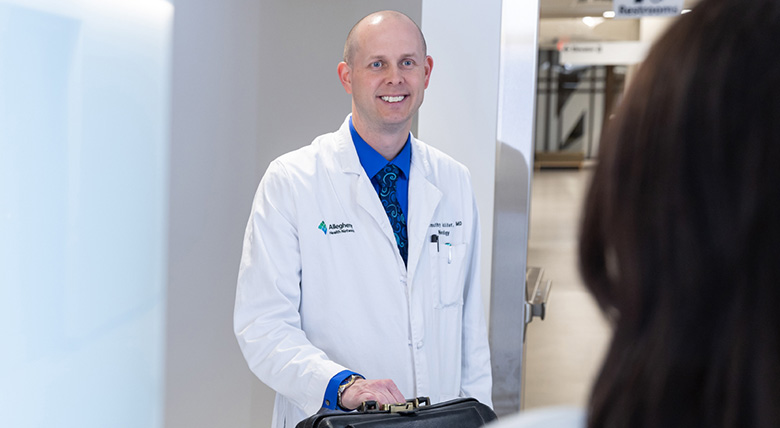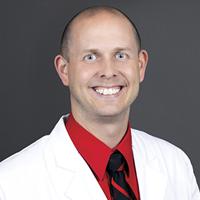Treating and Managing Movement Disorders at AHN

AHN Neuroscience Institute is proud to be leading the way in comprehensive care and leading-edge technologies to diagnose, manage, and treat a full range of movement disorders. With the prevalence of these conditions increasing as populations age — and with Allegheny County home to the nation’s second-oldest demographic — the demand for this specialized care is rising.
Specialized and comprehensive care
While AHN’s team of specialists welcomes patients at any stage — from first symptoms to advanced disease — early referral is critical.
“We can’t stop disease progression, but the earlier we can provide people with the right resources to help them manage it, the better they tend to do in living with their condition,” said Tim Leichliter, MD, AHN neurologist and movement disorder specialist.
To address the various ways movement disorders affect the body — from impacting organ systems to an individual’s speech and language — AHN applies a multidisciplinary approach for addressing the whole spectrum of symptoms through specialized clinics and holistic care.
Comprehensive Parkinson’s care
A prime example of our collaborative approach is AHN’s Cahouet Center for Comprehensive Parkinson’s Care. As the first of its kind in the region, the center serves as a hub of doctors and resources across specialties to support those with Parkinson’s disease, offering:
- A team of dedicated neurologists, nurse navigators, and speech, physical, and occupational therapists.
- Activities like exercise programs and music therapy.
- Access to Parkinson’s-specific resources and organizations.
- Educational programs and food support services.
- Collaborative treatment and multidisciplinary expertise in a single visit.
“At the center, we try to anticipate and address everybody’s needs in one place — both the patient and caregivers,” said Dr. Leichliter. “The goal is to cover everything, not just from the medical standpoint, but anything else they are going to need to be successful in living with and managing their condition.”
Comprehensive spasticity care
For people with movement disorders resulting in muscle pain or stiffness from spasticity, AHN offers a specialized clinic where patients can receive care including evaluations, medication adjustments, and injection treatments all in one place and often in one single visit.
With AHN’s collaborative care model, patients also have access to a network of neurologists, neurosurgeons, physical and occupational therapists, and more to ensure their needs are met at any stage of treatment and for years to come as they manage their condition.
Advanced treatment options
AHN neurologists and comprehensive care teams provide compassionate care and novel treatments to patients with a variety of movement disorders including Parkinson’s disease, tremors, dystonia, Huntington’s disease, Tourette syndrome, and ataxia.
While all care is tailored to each unique individual, treatment plans may include:
- Pharmacologic therapy and lifestyle interventions
- Procedures like Deep Brain Stimulation (DBS) for Parkinson’s, essential tremor, epilepsy, and dystonia
- Intrathecal baclofen pump surgery for severe spasticity
- Botox® injections for conditions like hemifacial spasm and focal dystonia
Explore more treatment options at AHN Neuroscience Institute.
How to refer
If your patient is experiencing movement disorder symptoms at any stage, refer them to AHN Neuroscience Institute today. Call 412-359-8850 (NEU).
About Timothy A Leichliter, MD
Dr. Leichliter treats patients with Parkinson’s disease, essential tremors, dystonia, Huntington’s disease, ataxia, and tic disorders. He is skilled at administering Botulinum toxin and performing deep brain stimulator adjustments. He is particularly interested in researching clinical care for movement disorders. Dr. Leichliter received his medical degree from Temple University School of Medicine in Philadelphia, Pennsylvania. He completed his residency and his fellowship training at Allegheny General Hospital in Pittsburgh, Pennsylvania.
AHN Neuroscience Institute experts treat neurological conditions, from headaches to brain tumors, with the most advanced treatments available.


